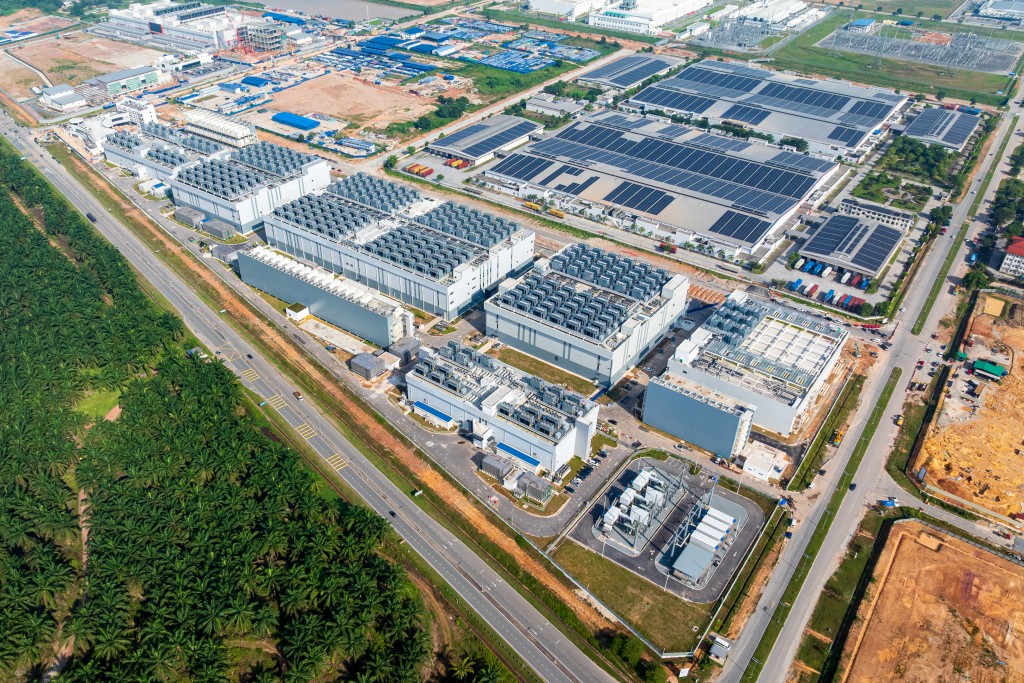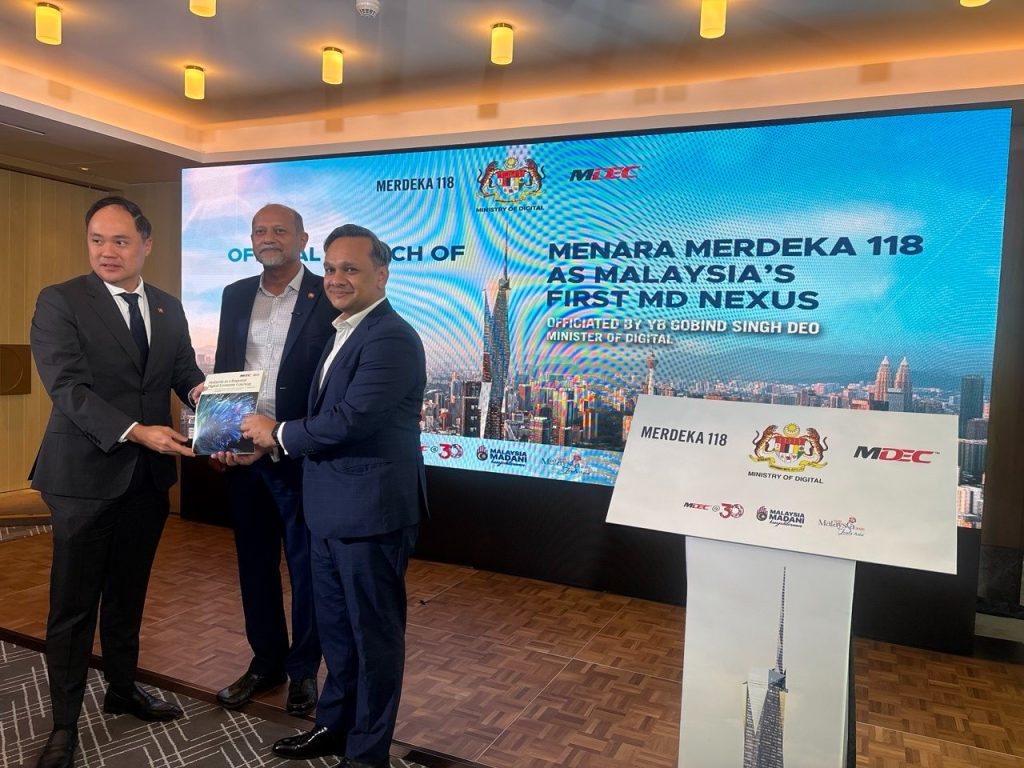Sedenak-Kulai and Iskandar Puteri vanguards of data centres
By Yip Wai Fong
Since 2020, Johor’s rapid rise in data centres has been unstoppable. With 13 operational data centres, 15 under construction and 14 approved in principle, Johor currently leads in terms of IT capacity, accounting for close to 80% of the country’s total live IT capacity.
According to Knight Frank, between 2020 and 2024, Johor’s data centre market grew by 318MW per annum, recording an aggregate supply of 1,296MW as of the end of 2024—56 times the state’s capacity in 2020.
Operational data centres are concentrated in the Sedenak-Kulai area, where the Sedenak Technology Park, part of the Ibrahim Technopolis (IBTEC) and YTL Green Data Centre Park are located. Currently one of the flagship zones of the JS-SEZ, Sedenak-Kulai was also the first to attract multiple international data centre operators to invest in and acquire land for data centre developments in Malaysia, including Princeton Digital Group, K2 Data Centres and the partnership between NVIDIA and YTL.
Another key location for data centres is Iskandar Puteri, with recent completions including facilities by Equinix and GDS Holdings, complementing existing data centres operated by Telekom Malaysia at Nusajaya Techpark. In February, AirTrunk announced a second data centre campus with a total capacity of 270MW to be constructed at the site.
Knight Frank noted that while the Klang Valley has the most data centres, the Johor market is distinct, with 53% of planned data centres having an IT capacity of 100MW or more. Notable operators such as Microsoft, AirTrunk, Bridge Data Centres, EdgeConneX, GDS Holdings and Princeton Digital Group have announced plans for such large-scale developments.
Strategic position, enhanced by JS-SEZ
At the recent launch of the Brightray Data Centre in Sedenak, state investment, trade, consumer affairs and human resources committee chairman Lee Ting Han said Johor is well on its way to becoming Southeast Asia’s data centre hub.
“To put this in perspective, it took Singapore almost 15 years to establish itself as a global data hub with around 70 data centres, totalling 1.4 GW capacity, whereas Johor, in just a few years, has welcomed 42 projects and already has an operating capacity approaching similar scales. This momentum underscores Johor’s strong fundamentals and strategic advantages,” he said.
“Johor’s location at the southern tip of Malaysia places it at a strategic crossroads of regional network infrastructure. We are close to major internet exchange hubs and submarine cable landing points in Singapore, enabling low-latency connectivity for global cloud services. At the same time, Johor offers abundant land and competitive costs for large-scale data centre campuses. Our state has ample industrial land banks, such as the Sedenak Tech Park in Kulai and other designated zones, and robust power infrastructure to support high-capacity facilities.
“Infrastructure and stability are also key factors. Malaysia’s reliable power grid, improving renewable energy supply, Johor’s developing transportation links and the state’s overall stable socio-political environment all give investors confidence,” he added.
The signing of the JS-SEZ agreement has given more positive signals to the data centre market with the promise of incentives and seamless cross-border facilitation.
“Post-JS-SEZ signing, JLand Group (developer of IBTEC) has seen a marked increase in inbound investor enquiries from Japan, South Korea, Taiwan, Singapore and even Europe. Many of these investors are seeking industrial land for advanced manufacturing, regional bases for smart logistics operations, data centres and renewable energy integration zones,” said group managing director Datuk Akmal Ahmad.
“IBTEC has moved from concept to execution—and now, to conversion. With JS-SEZ amplifying visibility, credibility and investor interest, IBTEC stands as Johor’s deep-tech nucleus and real estate engine for the new economy,” he added.
Sustainability issues
However, due to concerns about resource strain from the rapid growth of data centres, the state government has adopted more stringent approval processes. As much as 30% of applications were reportedly rejected last year, primarily for failing to demonstrate sustainable practices to reduce water and energy consumption.
Meanwhile, federal policies such as the Corporate Renewable Energy Supply Scheme (CRESS), under the National Energy Transition Roadmap (NETR), encourage data centres to adopt renewable energy by opening access to the grid network for renewable energy developers. Data centres that have responded to this call include AirTrunk, Bridge Data Centres and GDS Holdings, implementing strategies such as installing rooftop solar panels and partnering with renewable energy suppliers.
AirTrunk also recently announced a partnership with Johor Special Water (JSW), a wholly owned entity of the Johor State Government, to jointly develop a recycled water supply for its data centre campuses. The partnership also includes investment in treatment and supply infrastructure for recycled water.
Economic value
Lee stated that the state’s vision is to become a global destination for the world’s largest technology companies and to ensure that investments deliver tangible benefits, including skilled jobs for locals, knowledge transfer and sustainable development.
As Johor advances its digital economy, data centres serve as the core infrastructure around which a supporting ecosystem is being developed. Lee noted that the state is already focusing efforts on attracting companies that provide essential components and services—such as cooling systems, power equipment, semiconductors and construction materials. Once this ecosystem matures, Johor plans to leverage its digital infrastructure to draw investments in advanced tech sectors such as AI, cloud computing and big data—positioning itself as a hub for high-tech innovation.
Lee also said the state is working closely with the private sector to develop the local talent pool for the digital economy.
“A common critique of data centres is that they do not create as many jobs as traditional factories. While it’s true that data centres are highly automated, the jobs they do create are skilled and well-paying—and they catalyse employment in construction, maintenance, security and ancillary services. We are working closely with the private sector and educational institutions to train local talent in electrical and mechanical engineering for data centre operations, network management, cloud computing skills and more,” he said.
Stay ahead of the crowd and enjoy fresh insights on real estate, property development and lifestyle trends when you subscribe to our newsletter and follow us on social media.















































